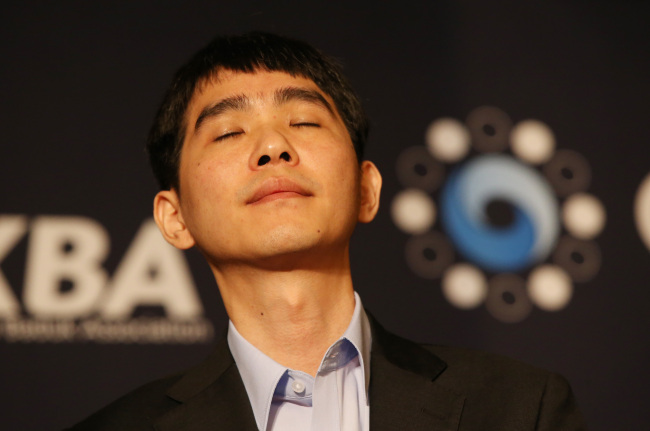Google’s artificial intelligence program AlphaGo defeated Korean Go champion Lee Se-dol in their historic first showdown Wednesday.
In a landmark match held at the Four Seasons Hotel in Seoul, the Google AI beat Lee by resignation in 186 moves after a fierce tug of war for more than 3 1/2 hours.
“I was really surprised. I didn’t think I could lose,” Lee said at a press conference after the match.
“I didn’t think AlphaGo would play in such a perfect manner. I like to express my respect to the Google team for making such an amazing program.”
 |
Lee Se-dol responds to reporters after a defeat to AlphaGo on Wedesday in Seoul. Yonhap |
The two players have four more matches to play. The second match on Thursday, in particular, seems important for Lee, the highest ninth dan player with 18 international titles, to take revenge and lead the remaining matches.
Unlike the relatively peaceful matches with Fan Hui, the first professional Go player to compete with AlphaGo, in October, the Wednesday match was a nip and tuck race.
Unlike expectations, Lee chose black stones to open the race. Under Chinese Go rules, a player playing with white stones receive advantages for playing later.
After he put his first stone in the right top corner, it took 1 minute and 30 seconds for AlphaGo to make its first move in the left top corner. Its stones were placed by Google DeepMind Programmer and amateur sixth dan player Aja Huang.
Lee, known for his aggressive and unconventional style of play, put stones in unexpected places at times and AlphaGo seemed confused about his moves.
But despite some clumsy moves, the AI never seemed distracted and that frustrated Lee at the last moment.
“AlphaGo’s skill has drastically improved even after its first victory against a human player months ago,” said a commentator during the match.
Google has not revealed any information behind AlphaGo except the records of the previous five matches with Fan Hui.
Go, more widely known as “baduk” in Korea, is a territory game that requires intuition and creativity, among others.
Due to its numerous possible moves -- 10 to the power of 700 -- Go has been widely considered a good method to gauge how AI can evolve to mimic or exceed human expertise.
Amid mixed outlook for the human vs. AI matches, Alphabet -- Google’s parent company -- executive chairman Eric Schmidt, who visited Seoul to watch the matches in person, said Tuesday: “It will be a great day for humanity regardless of the outcome.”
By Kim Young-won (wone0102
jylee@heraldcorp.com">@heraldcorp.com)








